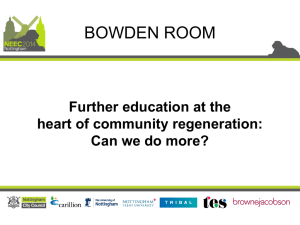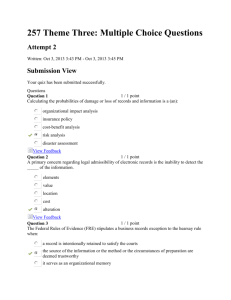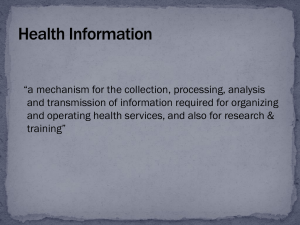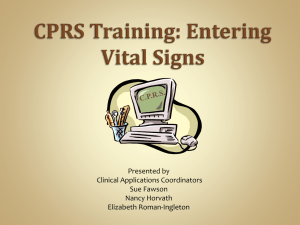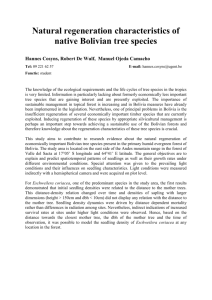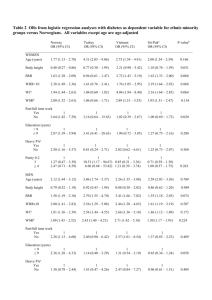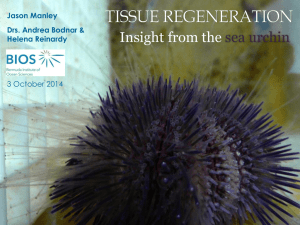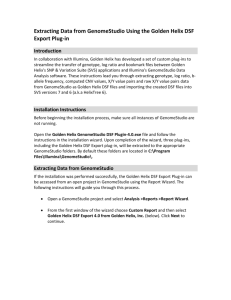Briefing note Cllr Astaire final
advertisement
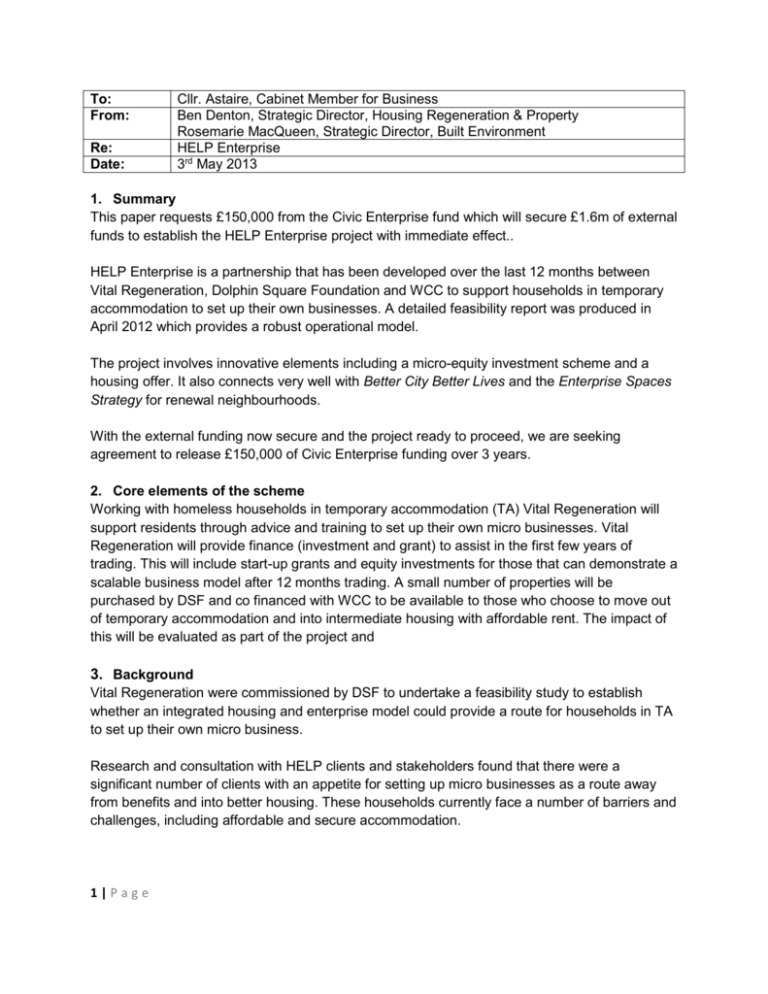
To: From: Re: Date: Cllr. Astaire, Cabinet Member for Business Ben Denton, Strategic Director, Housing Regeneration & Property Rosemarie MacQueen, Strategic Director, Built Environment HELP Enterprise 3rd May 2013 1. Summary This paper requests £150,000 from the Civic Enterprise fund which will secure £1.6m of external funds to establish the HELP Enterprise project with immediate effect.. HELP Enterprise is a partnership that has been developed over the last 12 months between Vital Regeneration, Dolphin Square Foundation and WCC to support households in temporary accommodation to set up their own businesses. A detailed feasibility report was produced in April 2012 which provides a robust operational model. The project involves innovative elements including a micro-equity investment scheme and a housing offer. It also connects very well with Better City Better Lives and the Enterprise Spaces Strategy for renewal neighbourhoods. With the external funding now secure and the project ready to proceed, we are seeking agreement to release £150,000 of Civic Enterprise funding over 3 years. 2. Core elements of the scheme Working with homeless households in temporary accommodation (TA) Vital Regeneration will support residents through advice and training to set up their own micro businesses. Vital Regeneration will provide finance (investment and grant) to assist in the first few years of trading. This will include start-up grants and equity investments for those that can demonstrate a scalable business model after 12 months trading. A small number of properties will be purchased by DSF and co financed with WCC to be available to those who choose to move out of temporary accommodation and into intermediate housing with affordable rent. The impact of this will be evaluated as part of the project and 3. Background Vital Regeneration were commissioned by DSF to undertake a feasibility study to establish whether an integrated housing and enterprise model could provide a route for households in TA to set up their own micro business. Research and consultation with HELP clients and stakeholders found that there were a significant number of clients with an appetite for setting up micro businesses as a route away from benefits and into better housing. These households currently face a number of barriers and challenges, including affordable and secure accommodation. 1|Page Micro-enterprises are small businesses that cost little to start-up. They are particularly advantageous for people who find it difficult to access the formal job market. Vital Regeneration produced a detailed feasibility report (attached) setting out these key findings in addition to a detailed analysis of micro enterprises and an operational plan for delivering an innovative enterprise project in Westminster. 4. Service offer to clients Vital Regeneration will expect to achieve the following outputs within the first 3 years: • • • • • • Support 180 clients with advice Establish over 100 new businesses Assist over 40 individuals to earn enough to afford intermediate housing Move 20 clients into paid employment 5 households will be offered intermediate homes in Westminster, moving from temporary accommodation and off the council’s waiting list See a modest return from investment in micro-enterprises. HELP Enterprise will provide intensive business advice, support and training to help people develop, launch and grow their micro-enterprises. 5. Funding Capital WCC will invest £375,000 from the Affordable Housing Fund matched with £1.2m from DSF to acquire properties in the City which will be offered to a selection of participants. This investment allows DSF to contribute £240,000 to the operating costs of the project. The investment is at equivalent rates to other housing schemes funded by the Affordable Housing Fund and WCC will retain equity in the properties which are acquired. This project will deliver savings to the council’s temporary accommodation budget as well as wider savings to the public purse. Operating costs The operating costs for three years are estimated to be £620,000. Vital Regeneration have agreed to fund £230,000 of the costs. The funding proposal is set out below. 2|Page 2013 2014 2015 Total Capital DSF £1,200,000 0 0 £1,200,000 WCC £ 375,000 0 0 £ 375,000 £1,575,000 £1,575,000 Revenue DSF £96,000 £96,000 £48,000 £240,000 WCC Civic Enterprise £60,000 £60,000 £30,000 £150,000 £230,000 £230,000 £308,000 £620,000 Vital Regeneration . £156,000 £156,000 WCC and DSF are asked to commit 80% of their revenue funding to cover the first two years of running the project. It is proposed that a review is undertaken in the second year of operation (Sept – Dec 2014) and that the remaining 20% of funding for year 3 will be released if Vital Regeneration are successfully achieving year 2 targets and have secured the £230,000 required. 6. How Civic Enterprise funding will work It is proposed that CEF of £150,000 would be split between grant funding and a commercial investment with a return (revenue share) from the latter coming back to WCC. The proposal is that the split would be 100% grant in year one moving to 50% grant and 50% investment in year 2, ending up with 100% investment in year 3. This would give an overall mix of £90,000 grant and £60,000 commercial investment. It is proposed that the return on investment is a 25% share of revenues achieved from 2016 onwards as detailed in appendix 1. The total revenue cost of the project for a 3 year period is £620,000 of which CEF is contributing £150,000. More than £200,000 of the total £620,000 project cost is passport-ed directly to clients as grants and business investments with the remainder being operational costs to deliver the project. 3|Page 7. Innovation / contribution to Better City Better Lives This project is an innovative scheme focused on supporting households who face significant barriers to employment and provides real opportunities for them to use their skills to improve their economic prospects and health and well being, and that of their household. HELP Enterprise brings together a partnership between three agencies, each of whom could deliver their strand of activity separately. It is an opportunity to bring the work of the agencies together to deliver a project with more synergy and an integrated offer to homeless households delivering better outcomes - of self-employment and the potential of a new home. An investment is being made in both bricks and mortar and in the individual by providing economic and housing opportunities which supports them to become independent and self-sufficient. It also builds on the financial capabilities of each partner and uses the funding commitments to lever in additional funding to Westminster. HELP Enterprise is closely aligned to the aspirations set out in Better City, Better Lives. By enabling Westminster residents to set up their own enterprises it will ensure that these are embedded in and connected with local communities. It creates a ladder of opportunity for households in temporary accommodation to achieve their full potential and in doing so will create a more enterprising city 8. Attractions of the scheme for WCC The scheme has a number of attractions for the City Council broadly summarised below: Aligns with government policy to incentivise work, encourages economic independence and diminishing reliance on welfare benefits Supports enterprise and local economy focusing on micro businesses which may not have been funded to date – car washing, hairdressing etc Realises savings in the TA budget by moving a cohort out of TA It links and rewards economic activity to housing Supports a number of wider objectives of Better City Better Lives and of the Housing Renewal Strategy If successful could be rolled out as part of the employment and enterprise offer on renewal estates Offers significant benefits to the client – innovative offer improving health, well being and economic prosperity which is particularly attractive to households for whom traditional employment routes may not be suitable. Attracts leverage – from DSF & from VR corporate sponsors 4|Page Investment is at equivalent rates to other housing schemes Retain equity in properties which are acquired. 9. Next steps In order to move the project forward a decision on funding is required. This proposal will be incorporated into a paper to Cabinet Member for Business. A tri-partite legal agreement will be drawn up between all parties setting out obligations and associated funding. Once all the funding is in place and the legal agreement have been signed the project will be launched, with Vital Regeneration recruiting to posts and initiating work with clients, and DSF acquiring properties in an agreed location. A review of the project will be undertaken towards the end of year 2. The remaining 20% of funding for year 3 will be released if Vital Regeneration are successfully achieving year 2 targets and have additional funding in place to go forward. If the project is successful this review will also explore how to scale up the project to work with a greater number of clients and deliver more outcomes. 5|Page Appendix 1. HELP ENTERPRISE 2013 - Civic Enterprise Fund (CEF) terms CEF Outgoings Grant funding Commercial investment CEF total outgoings 2013 60,000 60,000 2014 2015 30,000 30,000 30,000 60,000 30,000 CEF Returns Forecast revenue share (25%) from Vital Investment Vehicle Total 90,000 60,000 150,000 2016 2,937 2017 6,005 2018 9,212 2019 15,499 2020 22,069 2021 28,935 2022 39,047 2023 49,613 Total 173,317 Total predicted financial return on investment from equity 11,746 share 24,020 (ref: P46 of HELP Enterprise Feasibility Study) 36,847 61,996 88,277 115,741 156,187 198,452 693,266 NOTES: Total CEF contribution represents c25% of total income (£150K of £565K) 6|Page

